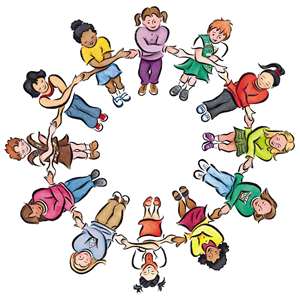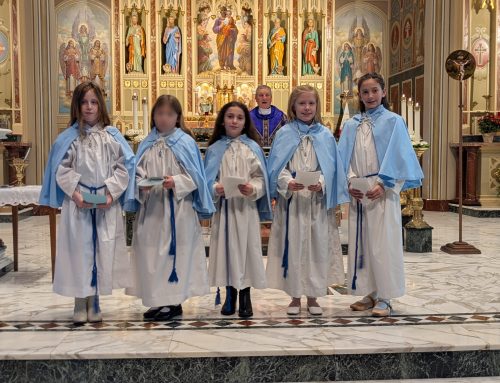Please take a moment to read a recent commentary written by Msgr. Czarnecki that was published in the Webster Times and The Catholic Free Press.
Has Sunday Lost Its True Meaning?
We all agree that we experience the celebration of Sunday in a quite different way than when we were growing up. The day’s character seemed quieter, calmer, and slower. On this special day of the week, there were no screeching chain saws, mowers, or leaf blowers piercing the serene atmosphere in the neighborhood. Cars zoomed by less frequently than during the regular weekdays. Stores were closed or nearly empty. Sports games yielded to higher pursuits. Whether it was driven by deep religious motivation (“Observe the Sabbath day and keep it holy” Dt 5:12) or a purely social need for rest or family time together, nevertheless the relaxed pace of Sunday was readily recognizable. Even those individuals who did not practice the Christian faith still set Sunday for family, friends, and refueling physically and mentally. The special character of Sunday is no longer clearly visible, which is why it is worth revisiting its meaning and renewing its centrality in our schedules.
By divine commandment, the Jewish people set aside the Sabbath for rest and gatherings devoted to remembering God’s covenant. There was a mixture between austerity and festivity, a tension between prohibition and liberation. Sunday eventually emerged as the paramount day of worship for Christians. The early Christians did not neglect to meet together (at sunrise!). They yearned to come together for the public worship of the Triune God and to encourage each other in the faith (Heb 10: 24-25). It marks the day that Jesus resurrected. Every Sunday was and continues to be a “little Easter” where Christians celebrate, as Saint Pope John Paul II reminded us in his Apostolic Letter Dies Domini, “Christ’s victory over sin and death, the fulfillment in him of the first creation and the dawn of ‘the new creation.’”
The Emperor Constantine in the fourth century, for reasons debated by historians, enshrined Sunday as a day of rest for his empire, thereby cementing the Christian practice of gathering together for worship and fellowship on Sundays. Throughout Christian history, love for God is seen as having both a private, internal aspect and also a communal, outward dimension. Public worship cannot be neglected for Jesus promised: “Where two or three are gathered in my name, there I am in the midst of them” (Mt 18:20). In time, the liturgy on Sunday became seen as fulfilling the moral command of the Old Covenant.
Fast forwarding from the early Christians to the early settlers in Massachusetts, it is interesting that the Puritans were especially intent on linking Sunday with the Sabbath observance. The authorities of the Massachusetts Bay Colony made sure that the legal structure supported their conviction. Beginning in 1648, the law said: “Whoever shall prophane the Lord’s Day by doing any servill worke shall be fined or whipped.” All New England states had laws restricting various activities on Sundays in order to keep people focused on spiritual pursuits. Many today still remember the so-called Blue Laws, enacted by the Puritan settlers in the 17th century and largely in force in some form until the 1980s.
The point isn’t to complain about how societal norms have changed. Christians, after all, place their hope in the coming of the reign of God so we cannot be pall bearers of the past or perpetual mourners of bygone eras. We examine the past so that we can look at the present with a greater maturity and understand it with greater depth. Sunday has not only a religious dimension but is also for our common good. Material preoccupation which contemporary civilization favors; disregards spiritual, moral, and cultural values, and at the same time it negatively impacts humanitarian interests. In this scenario the family is affected and children are deprived of the highest values. The point here is that we, as a society, must keep the real meaning of Sunday in our collective memory and common practice because a day of rest and recollection orders our lives rightly. It benefits us all to have a day set apart.
Ironically, a century ago only the head of the household worked to earn a wage for his family, but today both spouses work countless hours and still have difficulty paying the bills despite statistically having fewer children than in the past. Technology, which was supposed to lessen our loads and make life easier, seems to have made our schedules more complicated. When Sunday becomes just another day to do chores on a list, the spiritual life of Christians suffers, and the social fabric of the whole community begins unraveling because everyone is endlessly preoccupied with fulfilling some of their own egocentric needs and wants.
Even in countries where Christians are a single-digit minority, Sunday continues to be recognized as a day of rest. If places such as China, India, Indonesia, Mongolia, Pakistan, Turkey, Thailand, and others can keep one day different, so can we with our rich historical, social, and theological heritage treat Sunday more than just the end of the week?
The Catechism of the Catholic Church puts it nicely: “God’s action is the model for human action. Evolution of social and economical trends influences human behavior and eventually the way we celebrate Sunday. If God ‘rested and was refreshed’ on the seventh day, human beings too ought to ‘rest’ and should let others, especially the poor, ‘be refreshed’ (Ex. 31:17). The Sabbath brings everyday work to a halt and provides a respite. It is a day of protest against the servitude of work and the worship of money (cf. Neh. 13:15-22; 2 Chr. 36:21).” When we rest—rather than running non-stop like money-making machines—we are more authentically human and, thereby, more divine. No man or community can continually work without rest. Sunday celebration relieves the person from many demands and opens a space for relaxation, regeneration, and enables a person to question the sense and orientation of his life.
Sunday for Christians is the preeminent day of strengthening our friendship with God, especially by attending a liturgy at church. The Lord’s Day should be a day of rest—not total inactivity, but of spiritual exercises. Step away from the dizzying programs on television, and meditate on a passage from Sacred Scripture you heard in church or read another spiritually-beneficial text. Refrain from toilsome labor so that you can step back from a hectic routine and look at everything around you through a contemplative lens. Admire, for example, the beauty of nature with “a gaze full of joyous delight” (see John Paul II Dies Domini [The Lord’s Day]). Let Sunday be a day of visiting the resting place of your loved ones who have already passed to the heavenly homeland. Let Sunday be a day of faith-filled service and good deeds. For at least that one day each week, step aside from consumerism and materialism, and—both communally and individually—reflect upon the things that are beyond any price. Let Sunday be a day of thanksgiving for all the blessings God has bestowed on your life. Let Sunday be the preeminent day of praising your creator, redeemer, and sustainer. Let Sunday be a day of family gatherings and personal encounters with friends to recall the good times and the bad—and how God’s providential care has somehow always been there. Briefly speaking, Sunday should be a time when we reflect how to be more than to have more.
Rev. Msgr. Anthony Czarnecki, Rector, St. Joseph Basilica











